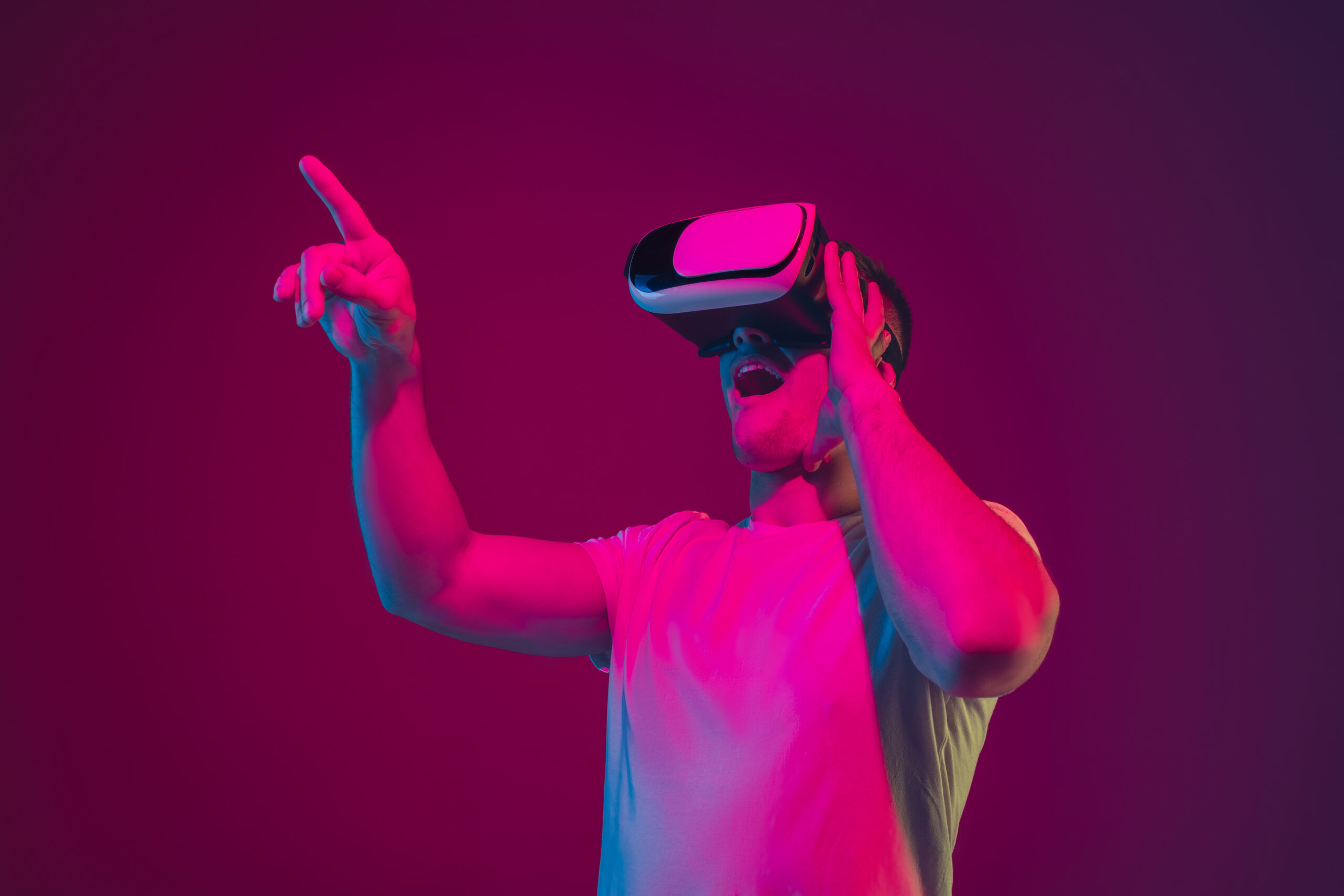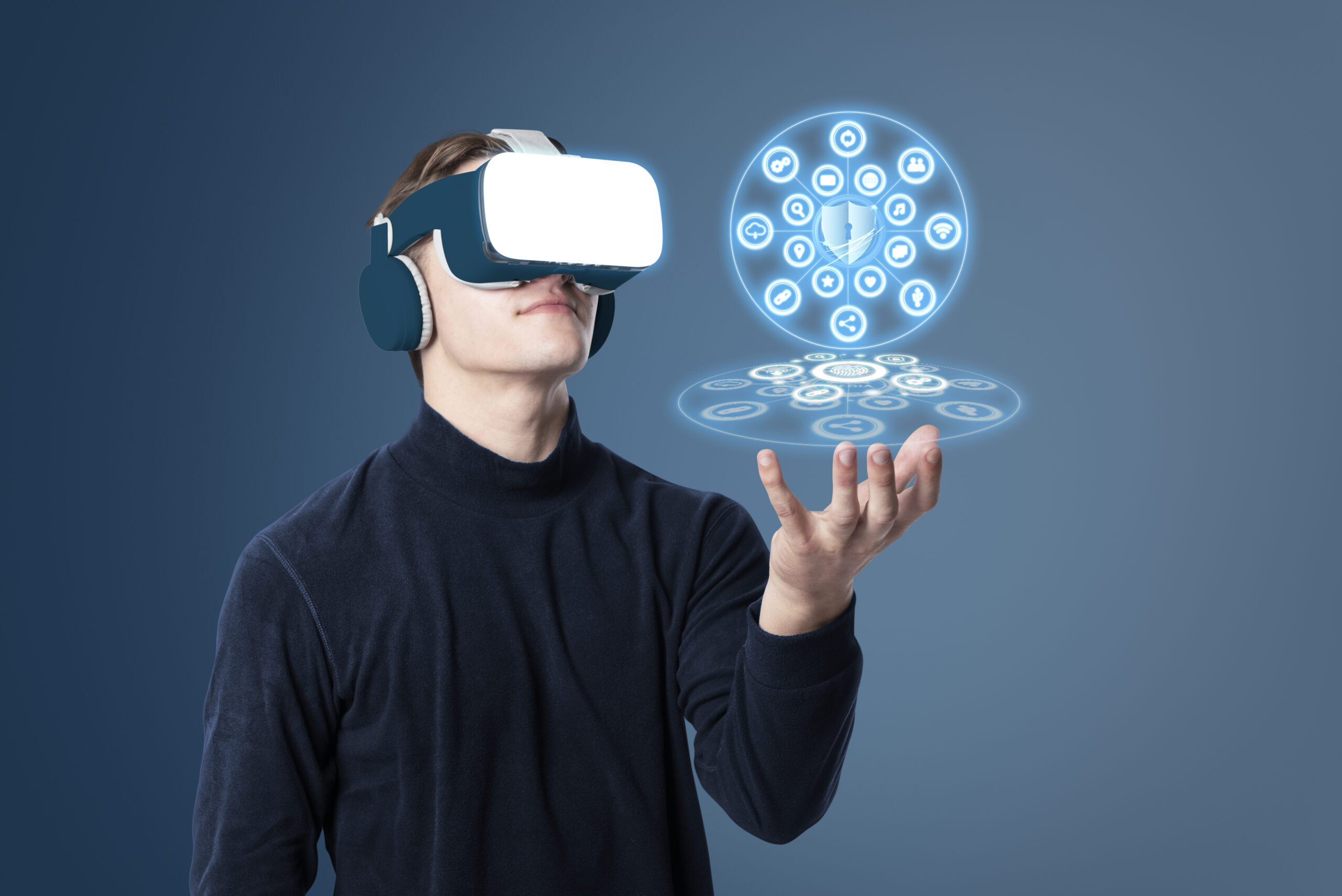Metaverse Development Solutions
An organization that specializes in creating compelling virtual environments and experiences is the ideal solution provider for metaverse development. It employs a group of talented programmers who are proficient in cutting-edge technologies, including blockchain integration, virtual reality, and augmented reality. The organization is known for its cutting-edge methodology, client success stories, and broad portfolio spanning various industries. The company stands out as a pioneer in the metaverse development industry, combining innovation, technological know-how, and a customer-centric approach to offer excellent metaverse solutions.
What is the metaverse?
Metaverse is a virtual, interactive, and networked digital world where users can communicate in real-time with other users and computer environments. It includes various platforms, gadgets, and technologies, as well as unique virtual environments. Metaverse combines blockchain development functionality, 3D graphics, augmented reality, and virtual reality to create a seamless and interactive digital experience. In addition to providing a new level of online presence and interaction beyond the typical Internet experience, this technology is also useful in gaming, socialisation, education, business, and other areas.
Why is the metaverse important?
The metaverse is important because it offers truly immersive and connected digital experiences and marks the next stage in the development of the Internet. This has the potential to revolutionise several aspects of our lives, including social interactions, education, and work. Businesses can gain access to new markets and revenue streams, and consumers can have a richer, more engaging online experience. Additionally, the metaverse supports advances in virtual reality, augmented reality, and artificial intelligence, creating limitless opportunities for innovation, teamwork, and economic development.
How does the metaverse work?
Virtual reality, augmented reality, blockchain, and networked digital environments all work together to support the metaverse. Users can view it using regular screens as well as VR and AR headsets. A decentralised blockchain is used to store information, guaranteeing the security and ownership of digital assets.
Users can navigate and interact in virtual environments through avatar-mediated interactions. A seamless and immersive experience is created through real-time communication and interaction. The metaverse as a whole is a networked, interactive digital environment that transcends specific platforms to provide a comprehensive and immersive online experience.

5 top technologies for metaverse development
Several key technologies are critical to creating immersive digital experiences in the metaverse development space. The highlight is virtual reality (VR), which allows people to step into 3D scenes and interact with them realistically. Seamlessly combining digital and physical aspects, augmented reality (AR) enhances user engagement and experience. Blockchain technology is needed to provide security and ownership of digital assets, including the increasingly popular non-fungible tokens (NFTs).
The metaverse is intelligent thanks to artificial intelligence (AI) that powers chatbots and provides a personalised experience. Finally, to ensure that users are fully engaged in this digital frontier, 3D graphics and spatial computing are essential to display realistic settings and provide spatial awareness.
Artificial Intelligence
Computer programs using artificial intelligence (AI) can perform actions that would normally require human intelligence. It includes skills in problem-solving, natural language processing and machine learning. Artificial intelligence (AI) is revolutionizing industries from healthcare to finance to entertainment, allowing computers to learn from data, make judgments, and perform complex tasks autonomously.
Internet of Things
The Internet of Things (IoT) is a global network of networked machines, vehicles on wheels, and objects equipped with sensors and software to exchange data. Through seamless connectivity and automation, this network improves ease and efficiency in many aspects of daily life, from smart cities and homes to business operations and healthcare systems.
Brain-computer Interfaces
Direct contact between the brain and external hardware is possible through brain-computer interfaces (BCIs). BCIs provide control over computers, prosthetic limbs, and many other healthcare and gaming applications by decoding brain impulses. They have great potential to help people with disabilities and advance neuroscience research. This technology has the potential to revolutionise how we connect and understand the brain as it develops, leading to new directions in human-computer interaction.
Blockchain
Blockchain is a decentralised digital ledger technology that securely, transparently, and immutably stores a record of all transactions across multiple computers. It consists of a series of linked blocks, each containing a cryptographic hash of the previous block. Cryptocurrencies such as Bitcoin are based on this technology, which is also used in the financial sector, supply chain, and healthcare. This has completely changed the way transactions and data are serviced and verified.
3D Graphics and Spatial Computing
Technologies such as spatial computing and 3D graphics are critical to creating immersive online experiences. Depicting objects and environments in three dimensions (3D) creates lifelike visual representations. By incorporating real-life spatial experiences, spatial computing goes a step further and enables interactions based on the user’s surroundings. This technology is important for creating believable virtual worlds and allowing users to explore and communicate, thereby enhancing the metaverse experience.
What is the metaverse used for today?
Metaverse is currently used for a variety of purposes, such as gaming, social interaction, virtual events, training, and business meetings. It offers an interesting multiplayer experience in the game. Users can connect and communicate with each other in virtual places thanks to social platforms in the metaverse. Virtual meetings, such as conferences and events, are an interesting replacement for physical meetings. In addition, metaverses are increasingly used for interactive learning and collaboration in academic and professional environments.
- Gaming and entertainment: The metaverse provides a platform for interactive entertainment and fully immersive multiplayer gaming.
- Social Interaction: It gives users access to virtual areas where they can interact, connect, and communicate with others in a virtual setting.
- Virtual Events and Conferences: The metaverse provides engaging substitutes for actual gatherings, enabling participatory virtual events and conferences.
- Education and Training: It is used for virtual classrooms, training simulations, and interactive learning environments.
- Professional Collaboration: Organisations are looking into the metaverse to host virtual meetings and workspaces to improve remote collaboration.
The Roles and Responsibilities of Metaverse Developers
Creating an immersive digital experience in the metaverse rests largely with the metaverse developers. They are responsible for planning and creating virtual environments, as well as the interactive features, 3D environments, and landscapes that serve as the basis for these virtual worlds.
To ensure functionality and a smooth user experience, they create and implement critical algorithms using their coding and programming knowledge. For a more immersive experience, Metaverse developers also use advanced technologies such as virtual reality (VR) and augmented reality (AR). They also use blockchain to create non-fungible tokens (NFTs), verify ownership of digital assets, and conduct secure transactions.
Successful project delivery depends on cross-functional collaboration between teams and open communication with stakeholders. To ensure a great user experience, they are also responsible for testing, troubleshooting, and performance optimisation across multiple platforms and devices. To effectively implement new solutions, Metaverse developers must keep up with current technologies and market trends.

Skills required for a Metaverse Developer
For Metaverse developers to successfully create immersive virtual worlds, they need a variety of capabilities. Creating realistic virtual environments requires knowledge of 3D modelling and design. Developing interactive sections and features requires strong programming skills in languages such as C#, Python, or JavaScript. Creating immersive experiences also requires technical knowledge of VR and AR platforms. Smart contracts and blockchain technology are essential for managing digital assets and performing secure transactions.
Debugging and problem-solving abilities are essential to solving any technology problems that may arise during development. Because engineers frequently collaborate with cross-functional teams and stakeholders, they also need effective communication and teamwork skills.
Implementing creative solutions requires an effort to keep up with the latest trends and new technologies in the metaverse. Equally important is a deep knowledge of user experience (UX) design concepts to ensure that virtual environments are easy to use and intuitive. Metaverse developers can create dynamic and engaging digital experiences that push the boundaries of virtual interaction by combining these capabilities.
FAQS
Q1: Who are the best metaverse developers?
Key metaverse developers include Unity Technologies, known for its versatile game development engine, and Epic Games, known for its advanced graphics capabilities in the Unreal Engine. Roblox Corporation has also made significant contributions by creating a user-friendly platform for creating metaverse-like experiences. These companies excel in the field of metaverse development.
Q2: Where can I get the best metaverse development services?
Look for reputable companies with a proven track record of achievement and knowledge of the specific technologies needed to develop the metaverse. It’s easy to find experienced metaverse developers and agencies online using sites like LinkedIn and industry forums.
Q3: What are the top metaverse projects?
- Roblox: A user-generated online gaming platform that allows users to create and play games created by other users.
- Decentraland: A blockchain-based virtual world where users can buy, develop, and sell parcels of land.
- The Sandbox: A virtual world and gaming platform where users can create, own, and monetize their gaming experiences.
- Somnium Space: A virtual reality world built on blockchain, offering users the ability to buy, sell, and build on virtual land.
- Cryptovoxels: A virtual world and gallery space that allows users to build, display, and monetize their creations.
Q4: What are the prospects for metaverse development companies?
Metaverse development companies have a very bright future. The desire for immersive digital experiences is expected to increase rapidly as technology advances. Gaming, education, virtual events, healthcare, and other industries are potential markets for metaverse development companies. The capabilities and appeal of the metaverse will also be enhanced by the integration of blockchain technology and artificial intelligence. The sector is expected to see tremendous growth and innovation in the coming years.
More Blogs You May Like
- The Future of iOS Dev and iOS App Development: 2024 Insights
- Mobile App: How To Develop Best On-Demand Cook & Chef Finder
- How Our GPS-Enabled Hire Driver Apps Ensure Accurate Tracking and Routing
- Cryptography – Real World Application
- New Trends in Digital Marketing 2024
- Major Benefits of Social Media Marketing for Businesses
- What is Flutter Developer | Flutter Developer Salary in India
- How Much Does It Cost To Build a Logistics App Like Uber Freight?
- What Is Metaverse? Exploring the Future of Digital Worlds
- How Organic SEO Services Keep Your Business Ahead in Search Results


